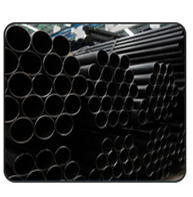Vitrag International is recognized as one of the leading Manufacturer and Supplier of Shutoff Valves, Needle Valves, Non-Return Valves, Relief Valves, Reducing Connections, Stand Pipes Adaptors, Rotary Fittings, Sea Flanges Flow Control Valves, Hydraulic Flanges & Components, Flareless Hydraulic Fittings, PVC Pipe Clamps, Pipe & Pipe Fittings, Hydraulic Hoses & Accessories, Valves and Fittings Accessories, Couplings, UHMWPE Products Etc.

- Range : 15 NB UP TO 1200 NB IN SCH 5S , 10S ,10, 20, 40S, 40, STD, 60, 80S, 80, XS, 100, 120, 140, 160 & XXS
- Form : Seamless / Erw / Welded in Round & Square
- Carbon Steel : ASTM / ASME A 53 GR. A , B
- ASTM / ASME 106 GR. A , B ,C
- API 5L GR. B , API 5L X 42 , X 46 , X 52 , X 60 , X 70.
- ASTM / ASME A 691 GRA , B ,C
- Alloy Steel :
- ASTM / ASME A 335 GRP 1 , P 5 , P 9 , P 11 , P 12 , P 22 , P 23 , P 91
- ASTM / ASME A 691 GRP1 CR , 1 1/4 CR , 2 1/4 CR , 5 CR , 9CR , 91.
Carbon steel and alloy steel are two broad categories of steel, each with distinct properties and applications.
Carbon SteelCarbon steel is primarily composed of iron and carbon, with small amounts of other elements. It is classified into three main types based on carbon content:
- Low Carbon Steel (Mild Steel) – 0.05% to 0.30% carbon Ductile, easily weldable, and machinable ,used in construction, pipelines, and automotive parts.
- Medium Carbon Steel – 0.30% to 0.60% carbon, Stronger than low-carbon steel, with moderate ductility, used in railway tracks, gears, and machinery parts.
- High Carbon Steel – 0.60% to 1.5% carbon, Very hard and wear-resistant but brittle, used in cutting tools, knives, and springs.
Alloy Steel
Alloy steel contains other elements besides carbon, such as chromium, nickel, molybdenum, vanadium, and manganese. These elements enhance specific properties like strength, toughness, corrosion resistance, or hardness.
-
Low Alloy Steel (small amounts of alloying elements)
- Alloy content: Less than 8%.
- proves strength and hardness.
- Used in pipelines, pressure vessels, and structural applications.
High Alloy Steel (higher concentrations of alloying elements)
- Alloy content: More than 8%
- Provides better corrosion resistance (e.g., stainless steel with chromium)
- Used in aerospace, automotive, and chemical industries.
Low Alloy Steel (small amounts of alloying elements)
Specialized Types of Alloy Steel
- Stainless Steel: Contains chromium (10.5% or more), corrosion-resistant.
- Tool Steel: High hardness and durability, used for cutting tools.
- Maraging Steel: Nickel-based, extremely strong, used in aerospace.
- Chromoly Steel (Chromium-Molybdenum Steel): High strength, used in bicycle frames, aircraft structures.
- High Strength – Carbon steel offers excellent tensile strength, making it ideal for construction, automotive, and industrial applications.
- Cost-Effective – It is relatively inexpensive compared to other metals like stainless steel or aluminum.
- Durability – Carbon steel is resistant to wear and tear, ensuring long-lasting performance.
- Malleability & Ductility – It can be easily shaped and formed into different structures.
- Recyclability – Carbon steel is 100% recyclable, making it an environmentally friendly option.
- Versatility – Used in construction, pipelines, tools, and machinery.
Alloy Steel Advantages
- Enhanced Strength & Hardness – Alloying elements like chromium, molybdenum, and vanadium improve strength and hardness.
- Corrosion Resistance – Some alloy steels (e.g., stainless steel) resist rust and oxidation.
- Improved Heat Resistance – Can withstand high temperatures, making it ideal for aerospace and power plants.
- Toughness & Wear Resistance – Suitable for tools, gears, and industrial applications.
- Better Machinability & Weldability – Some alloy steels are easier to work with compared to pure carbon steel.
- Fatigue Resistance– Performs well under cyclic loads, making it ideal for automotive and structural applications.
Applications of carbon and alloy steel
- Carbon Steel Applications : Low Carbon Steel (Mild Steel, <0.3% Carbon), Medium Carbon Steel (0.3% - 0.6% Carbon), High Carbon Steel (>0.6% Carbon).
- High Carbon Steel (>0.6% Carbon) : Chromium Steel (e.g., Stainless Steel),Nickel Steel, Molybdenum Steel, Vanadium Steel, Tungsten Steel